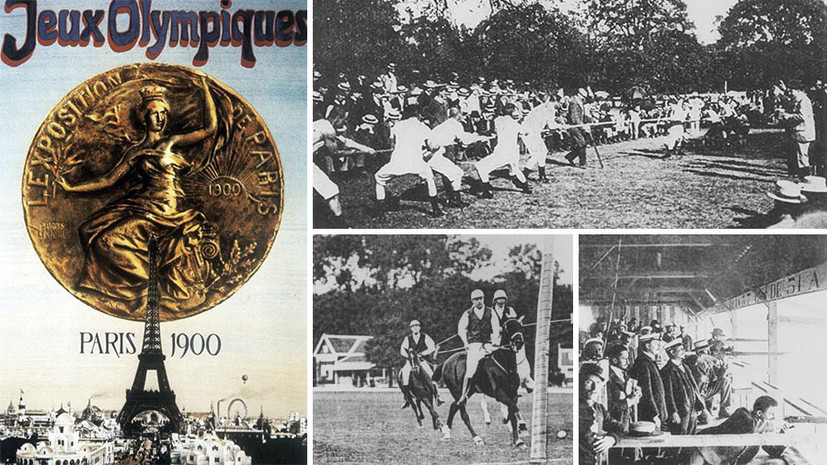Eli de Polyakov
The debut of Russian athletes at the Olympic Games took place in 1900 in Paris. The first to get the chance to excel and win medals were equestrian representatives. According to the official competition report, the application included two representatives of the empire - Prince Vladimir Orlov and Eli de Polyakov.
Unfortunately, very little information has remained about the competitions 120 years ago at the Olympics. Only the names of winners and prize winners in five disciplines are reliably known. The results of the Russians have not reached our days (and those that are not credible) and we only know for sure that they were not in the first three.
According to the most common version, the direct debut of the Russians took place on May 31. On this day, de Polyakov performed in competitions, called "horseback riding." The competitors had to show different types of horse walks and overcome two small obstacles. What place among all the participants was taken by the Russian representative is not known exactly.
Two days later, on June 2, a raffle was held in another discipline unusual for our days - the race on mail crews. Participants needed to drive a four-horse cart. Both Russian horsemen took part in this competition, but their final results also remain unknown. The biography of de Polyakov is also a mystery - apart from the name, surname and the very fact of participation in the Olympics, nothing was left for the sports history of Russia.
It is worth noting that, according to a number of sources, competitions in both disciplines took place within the framework of the Olympics, but were not considered Olympic disciplines.
Vladimir Orlov
Much more information has been preserved about another Russian participant in the Games in Paris. Prince Vladimir Orlov was the son of a general and diplomat Nikolai Orlov. Following the example of his father, he also built a military career and in 1906 headed the military field office of Nicholas II. Orlov was close to the emperor and was part of his retinue. It is known that the officer was the personal driver of the king and sometimes drove him in his car.
Orlov’s career went uphill until in 1915 he was removed from the yard due to hostility towards Grigory Rasputin. Then he was transferred to service in the Caucasus, and in 1917 sent to retirement. After the revolution, Orlov moved to France, where he died in 1927.
Orlov’s ties to sports were not limited to a modest, but historical participation in the Olympic Games. Through his first wife, Olga, he became related to the Beloselsky-Belozersky family. One of his brother-in-law, Sergei, actively developed sport in the Russian Empire and represented the country in the IOC for eight years. His brother Esper served in the Navy and at the 1912 Olympics became a bronze medalist in sailing.
Julian Michaud
Among the participants in the Olympic Games in Paris from the Russian Empire were two more fencers. Julian Michaud and his student Peter Zakorovot took part in the saber tournament among instructors (or the maestro, as they were called), held from June 23 to 27. This was one of the few disciplines in which professionals could participate. The International Olympic Committee allowed only amateurs to other competitions.
Michaud and Twist acted more successfully horsemen. They made it to the final eight, which in meetings between themselves determined the winner and prize-winners. In the semifinals, they took second and third places and could count on medals, but in the end Michaud became fifth, and Twist - seventh. For their performance, they earned 400 and 200 francs, respectively.
Julian Michaud came from a family of Belgians who moved to Poland. He was the only son of the poet and journalist Alexander Michaud. Michaud Jr. was engaged in saber fencing under the guidance of teachers from Italy and France. In the 1890s, he received a teaching position in the Warsaw Military Fencing and Gymnastics Hall, where he taught the art of handling the Sword of Zakovorot.
Details of the life of Michaud after the Olympics are few. It is known that in 1910 he, together with his student, returned to Paris for major competitions. This time, Twist became the third, and his teacher - fifth. Michaud died in Warsaw in 1925 and was buried in the Old Powzki Cemetery.
Peter Twist
Peter Zakorovot was born into a peasant family in the Kharkov province. In his youth, he was called up to the Grodno Hussar Life Guards Regiment, stationed in Warsaw. There he began to engage in fencing under the guidance of Michaud and so succeeded in saber that he even received the position of assistant to his teacher. In 1897, Twist continued his studies at the Budapest Military Sports Academy, where two years later he won the prestigious international tournament.
In 1910, after a trip to the Olympics in Paris, Zakovorot began to teach at the Main Gymnastics and Fencing School and the Naval Cadet Corps in St. Petersburg. After the advent of Soviet power, he continued to do what he loved, but already in Kharkov, where he moved in 1920. There he headed the department of fencing at the local institute of physical education. One of the first Russian Olympians died in 1951.
The short circuit brought up several well-known fencers and trainers in the USSR. Two of them, Ivan Manaenko and Vadim Andrievsky, in the future were part of the Soviet team and led it to victories at the most prestigious tournaments. Closyd Yadlovsky, the grandson of Zakovorot, devoted himself to fencing, who became the honored trainer of the USSR and raised the Olympic champion Svetlana Chirkova.

